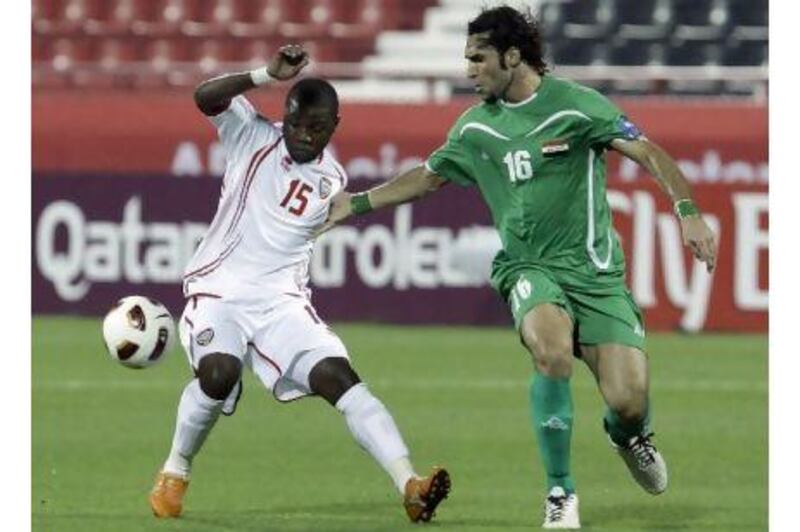There is hard. There is cruel. And then there is what happened to Walid Abbas last night at Al Rayyan Stadium in the Asian Cup.
After holding a key defensive position among a side that had shut out four opponents in seven matches and was about 180 seconds from blanking a fifth, the central defender stuck out his leg to deflect a shot into his own goal.
He did not deserve this. Neither did his side. Nor his manager. But there it stands: Iraq 1, UAE 0, and now the Emiratis have it all to do to advance out of Group D in the Asian Cup.
It was "Another One of Those Matches" for the UAE. Up and back, controlling the pace and the ball but unable to score.
That is six scoreless performances in eight matches now for Srecko Katanec's attack, and the drought assumed even greater proportions with the late gift to Iraq, which suddenly made "frustrating scoreless draw" seem like the sweetest gift football can bestow.
And now we recall that this same Iraq team won the 2007 Asian Cup with generous dollops of good fortune rather like this one. Maybe their mojo isn't spent.
Though the match ended painfully, it certainly was not outside what the national side has been showing us for about two months now.
Managing expectations is the most underrated skill in a coach's tool box. The clever ones understand that perceptions of success or failure are slippery, a sort of communal sense of what ought to be achieved.
Establishing the delicate balance between reasonable hope and unreasonable overconfidence is like walking the edge of a knife, and Katanec has been perched on the business end of the blade for weeks now.
It is not unreasonable to expect steady progress for the national team. The country's age-group teams have gone from milestone to milestone over the past few years, and now the kids are breaking into the national side.
The steady climb back to international relevance surely will continue unabated, yes?
That is the undertow in the thinking of UAE supporters. The Asian Games silver in November, the Youth Would Cup quarter-finals in 2009, the Asian U19 championship in 2008, the U23 Gulf Cup victory in August. Consider those, as well as the run to the semi-finals of the Gulf Cup by the senior team barely a month ago, and optimism is rising exponentially.
This is where a coach needs to manage expectations before he becomes a prisoner of them, and Katanec has been working hard at it, and the process is not necessarily an exercise in cynicism.
Sometimes a coach must abandon the role of cheerleader and take on the guise of realist. He has stressed two points, and the first is this: success in age-group competitions does not translate directly into senior success.
Katanec most recently made that point after a scoreless friendly with Australia. What Katanec said, in simplest terms, was this: "Our kids aren't playing against other kids anymore; they are playing against men."
The second point seems self-evident, but Katanec rightly recognises that it has not yet seeped into public consciousness: his side struggle mightily to score. The UAE have five goals in eight matches, and that is a hard way to win.
One day before the match, Katanec expressed confidence that his team would soon convert chances into goals, which was a correction in his tack of just a week before when he had gone on at length about how few Emiratis regularly appear in attacking positions in Pro League matches. From realist to cheerleader again. The balancing act at work.
Katanec has not been as specific in some other realities afflicting his side. To wit: they are remarkably small in stature; the side can barely muster a quorum to put in the box for a corner kick; 50-50 balls are more like 70-30.
Also, it is only 18 months since the senior team finished the 2010 World Cup qualifying at a low ebb, taking only one point from eight matches. This is a project, and far from complete.
Sure, the squad now have demonstrable attributes. Collectively, they are a fast side. They pass well and unselfishly. They handle the ball with aplomb. Amer Abdulrahman could dribble out of a locked closet. Ismail al Hammadi routinely makes clever runs. And they are very stingy in defence.
For the fifth time in eight matches, no opposition player was able to score last night. Unfortunately, Iraq still won.
Their joy was in inverse proportion to UAE footballing agony.





